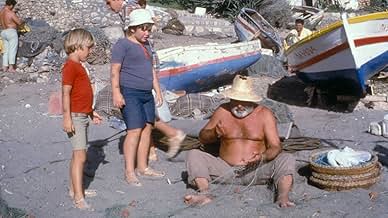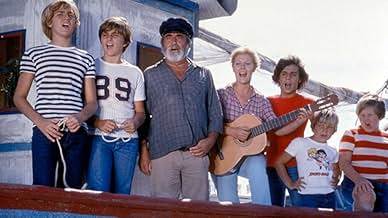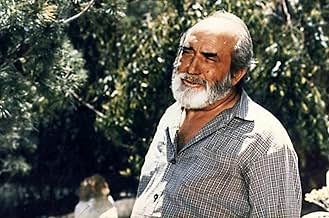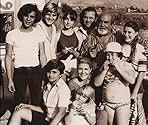Verano azul
- Serie de TV
- 1981–1982
- 50min
CALIFICACIÓN DE IMDb
7.9/10
1.3 k
TU CALIFICACIÓN
Quique, Javi, Pancho, Bea, Desi, Tito y Piraña - de entre 8 y 16 años - disfrutan de un verano lleno de aventuras con Julia, una pintora, y Chanquete, un sabio marinero jubilado.Quique, Javi, Pancho, Bea, Desi, Tito y Piraña - de entre 8 y 16 años - disfrutan de un verano lleno de aventuras con Julia, una pintora, y Chanquete, un sabio marinero jubilado.Quique, Javi, Pancho, Bea, Desi, Tito y Piraña - de entre 8 y 16 años - disfrutan de un verano lleno de aventuras con Julia, una pintora, y Chanquete, un sabio marinero jubilado.
- Premios
- 2 premios ganados y 3 nominaciones en total
Explorar episodios
Opiniones destacadas
This serial's part of my most pleasant memories from childhood. I saw it just once, I was about 8 at that time (1982), when it was broadcasted here in Yugoslavia. I strongly remember the great, warm atmosphere of Spanish coast, sweet old fisherman, nice, tender smile of Maria Garralon (but when I saw her recently in "Companeros", of course I couldn't connect her with that young teacher from "Verano Azul", it was just IMDb that brought me to it by her name). I remember that it had been broadcasted on Sundays at 1 PM and that I cried when it was finished.!Ojala! if I could see it once again!
This show was aired in Argentina somewhere around 1985 (can't recall the exact year). I totally loved it from the beginning and to the end. Being in Argentina I never got any information on the show other than what you see on the screen. There were no notes in the papers about it (that I remember at least) or anything else, so getting any info on the show was impossible. That was years before the Internet era of course. What a great surprise to find out now that it was a great success in Spain in it's day and that it is still remembered by many. What a great show, how much fun it was and what a great set of values it teached. Aguante Chanquete viejo y peludo, carajo!
I grew up with this series too. In Bulgaria it was such a success that the Bulgarian National TV repeated it five or six times. We all loved it. I remember all the kids from the neighbourhood playing "Verano Azul" day after day without getting bored or anything of the kind. Of course, all the girls were in love with "Javi" /Juan Jose Artero/ and "Pancho" /Jose Luis Fernandez/. I wish I could see or meet them now. Them and all of the cast. For me "Verano Azul" is the best film for children ever made. It portrays every important moment and every significant value in a child's life. I wish I could see the series again. In the meantime I can only say: "Gracias, chicos! Habeis sido estupendos! Os quiero y os quiero conocer para agradecerles de todo corazon todos los momentos felizes que me regalasteis! Un monton de besos!"
10Rueiro
To those of us who were kids or teenagers in the early 80s in Spain, "Verano Azul" –or Blue Summer, in a literal English translation- brings back many fond memories of what our childhood/adolescence was like.
There were two TV channels only, no home computers, play-stations, i-pods or mobile phones. And we kids would spend the whole day in the street playing ball, marbles, hide-and-seek, catch-me-if-you-can and many other games that are now extinct. Or we would pop to the local bar to play the pinball machines while having a Coke or a Fanta. We used to read Spanish comics, ride our bikes or play charades, and always had a great time. Also in those days summers were proper summers, before climate change came to screw things up. Our school summer vacation ran from mid-June to mid-September, and you hardly would see a rainy day in between. I hadn't seen the series for almost twenty years now, and when these past few days I had the chance of watching it again, my eyes filled with tears. I have been watching as many as three or four episodes every day, and couldn't get enough. Many things that I had forgotten suddenly popped back in my memory in that so well know effect that gives us the feeling that it happened only yesterday. I realise now how good this series really is because it is so realistic and well-made, with absolutely credible performances –those kids had real talent, they did-, typical teenage problems and situations within the context of the era, cultural icons, and the humour provided by Tito and Pirana, the youngest members of the gang. Because I am the same age as the actor who plays Tito, seeing him now is like seeing myself thirty years ago. These two cheeky kids always steal the show with their lines and with the innocent and plucky things they do.
I knew that the series had been a huge success in South-America but I had no idea about Bulgaria and Poland, and the reviews posted by people from these two countries have left me amazed. They say the show gave them one of the very first glimpses of the West and what kids were like in the free world, and they also say that the minute it would start on TV the streets became empty. I would have never imagined it.
This series is perfect in every way, and it is a good thing they never made a sequel (the typical thing with the youngsters returning to the village two or three years later and getting together again) because it surely could never be as good as the original.
There is a Spanish saying that goes "Good things, if they are brief, they are twice as good".
And it is true.
There were two TV channels only, no home computers, play-stations, i-pods or mobile phones. And we kids would spend the whole day in the street playing ball, marbles, hide-and-seek, catch-me-if-you-can and many other games that are now extinct. Or we would pop to the local bar to play the pinball machines while having a Coke or a Fanta. We used to read Spanish comics, ride our bikes or play charades, and always had a great time. Also in those days summers were proper summers, before climate change came to screw things up. Our school summer vacation ran from mid-June to mid-September, and you hardly would see a rainy day in between. I hadn't seen the series for almost twenty years now, and when these past few days I had the chance of watching it again, my eyes filled with tears. I have been watching as many as three or four episodes every day, and couldn't get enough. Many things that I had forgotten suddenly popped back in my memory in that so well know effect that gives us the feeling that it happened only yesterday. I realise now how good this series really is because it is so realistic and well-made, with absolutely credible performances –those kids had real talent, they did-, typical teenage problems and situations within the context of the era, cultural icons, and the humour provided by Tito and Pirana, the youngest members of the gang. Because I am the same age as the actor who plays Tito, seeing him now is like seeing myself thirty years ago. These two cheeky kids always steal the show with their lines and with the innocent and plucky things they do.
I knew that the series had been a huge success in South-America but I had no idea about Bulgaria and Poland, and the reviews posted by people from these two countries have left me amazed. They say the show gave them one of the very first glimpses of the West and what kids were like in the free world, and they also say that the minute it would start on TV the streets became empty. I would have never imagined it.
This series is perfect in every way, and it is a good thing they never made a sequel (the typical thing with the youngsters returning to the village two or three years later and getting together again) because it surely could never be as good as the original.
There is a Spanish saying that goes "Good things, if they are brief, they are twice as good".
And it is true.
Yes,it was great,that The Bulgarian TV showed it.It is true that this was something very different from the other films we had seen.It was the only story of its kind for the puberty then.We did not use to see films from Western Europe and they were not supposed to show,that life went normally in the West.I still remember the scene when Javi was made to dive in a pool with all his clothes by two nasty behaving girls and then he took off all of his clothes,even his speedos as a protest,and then he was punished by his father,who called him an "exhibitionist".We have never thought of such kind of protest and I remember we commented this scene even in class and the teachers told,that that came from the Western manner of life.Yeah,we commented the film and liked all the actors.A day or two ago I heard the song from the film and it made me drop a tear for my own childhood,which I will ever connect with these series.
¿Sabías que…?
- TriviaAs of 2006 this one is considered to be the all-time most successful TV series in Spain, with an estimated peak audience of 20 million viewers when it was first aired (a 38 million inhabitants country by then), so far it has been re-run 11 times in different Spanish TV channels and sold by TVE to many other countries (which is quite uncommon). Besides its 25th Anniversary edition DVD package has been one of the most successful in the Spanish video market in 2006.
- ConexionesFeatured in Muertos de risa (1999)
Selecciones populares
Inicia sesión para calificar y agrega a la lista de videos para obtener recomendaciones personalizadas
- How many seasons does Verano azul have?Con tecnología de Alexa
Detalles
Contribuir a esta página
Sugiere una edición o agrega el contenido que falta

Principales brechas de datos
By what name was Verano azul (1981) officially released in Canada in English?
Responda
![Ver Promo [OV]](https://m.media-amazon.com/images/M/MV5BY2IxOGE5NGEtOGU2OS00NmE2LTkyZGEtN2ZiYTdmZGY0ZDYzXkEyXkFqcGdeQWdhbWF6b2E@._V1_QL75_UX500_CR0)


























